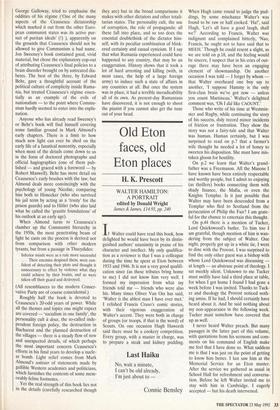Old Eton faces, old Eton places
H. K. Prescott
WALTER HAMILTON: A PORTRAIT edited by Donald Wright James & James, 174.95, pp. 240 If Walter could have read this book, how delighted he would have been by its distin- guished authors' unanimity in praise of his character and intellect. My only qualifica- tion as a reviewer is that I was a colleague during the time he spent at Eton between 1933 and 1946. It is not a very good qualifi- cation since (as these tributes bring home to me) I did not know him very well. I formed my impression from what my friends told me — friends who were also his. Many times Oliver Van Oss has said, 'Walter is the ablest man I have ever met.' I relished Francis Cruso's comic stories, with their vigorous exaggeration of Walter's accent. They were both in charge of groups (or troops, if that is the word) of Scouts. On one occasion Hugh Haworth said there must be a cookery competition. Every group, with a master in charge, was to prepare a steak and kidney pudding. When Hugh came round to judge the pud- dings, by some mischance Walter's was found to be raw or half cooked. 'Ha!', said Hugh, 'Let's all have a good laugh, shall we?' According to Francis, Walter was indignant and complained bitterly, 'NE), Francis, he ought not to have said that to MEEH.' Though he could resent a slight, as we are told on p.18, and the feeling would be sincere, I suspect that in his cries of out- rage there may have been an engaging element of showmanship. On another occasion I was told — I forget by whom that Walter overheard one boy say to another, 'I suppose Hammy is the only first-class brain we've got now — unless you count Martineau.' Walter's delighted comment was, 'Oh I did like CAOUNT.'
Those who write of his time at Westmin- ster and Rugby, while continuing the story of his success, duly record minor incidents of friction or frustration. They show the story was not a fairy-tale and that Walter was human. Human certainly, but I was surprised to read on p.7 that a farmer's wife thought he needed a lot of honey to sweeten his disposition. She must have mis- taken gloom for hostility.
On p.2 we learn that Walter's grand- father was a Freemason. All the Masons I have known have been entirely respectable and worthy people, but I admit to enjoying (as thrillers) books connecting them with shady finance, the Mafia, or even the Knights Templar. Is it just possible that Walter may have been descended from a Templar who fled to Scotland from the persecution of Philip the Fair? I am grate- ful for the chance to entertain this thought.
On p.44 there is a mention of Tucker, Lord Quickswood's butler. To him too I am grateful, though mention of him is wan- dering from the subject of Walter. One night, properly got up in a white tie, I went to dine with the Provost. I was surprised to find the only other guest was a bishop with whom Lord Quickswood was discussing at length — an abstruse point of theology. I sat meekly silent. Unknown to me Tucker must swiftly have laid a third place at table, for when I got home I found I had gone a week before I was invited. Thanks to Tuck- er and theology the Provost noticed noth- ing amiss. If he had, I should certainly have heard about it. And he said nothing about my non-appearance in the following week. Tucker must somehow have covered that up as well.
I never heard Walter preach. But many passages in the latter part of this volume, with quotations from his sermons and com- ments on his command of English make me feel that I have done so. What saddens me is that I was just on the point of getting to know him better. I last saw him at the Memorial Service for an Eton master.
After the service we gathered as usual in School Hall for refreshment and conversa- tion. Before he left Walter invited me to stay with him in Cambridge. I eagerly accepted — but his death intervened.


































































 Previous page
Previous page